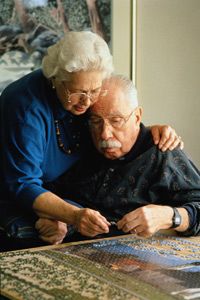On May 19, 1965, a young man named Pete Townshend turned 20 years old. Townshend, who would go on to rock 'n' roll glory with the band The Who, was riding a train that day, and he penned a song that captured the struggles between young and old. Older people just didn't seem to understand what it was like to be young, and Townshend wanted no part of the elderly generation's cluelessness. "I hope I die before I get old," became part of the refrain of the song he wrote that day, which was titled "My Generation."
Townshend and The Who's lead singer, Roger Daltrey, continue to perform the song despite the fact that they're both on the upper side of age 60. And rock 'n' roll gods aren't the only ones getting older; these days, we're all living longer. We don't want people to notice we're getting older, though, as the popularity of hair dyes, liposuction, anti-aging creams and, of course, Botox can attest.
Advertisement
If we can take steps not to look our age, can we take steps not to act our age? With aging come those frustrating and embarrassing memory lapses that have us hunting for the eyeglasses that are sitting on top of our head, the car keys that are in our pockets or the phone numbers we used to know by heart. A little loss of memory is normal as we age, but could it be the sign of something more? Is it the first sign of a degenerative cognitive decline?
Alzheimer's disease is the most common cause of dementia, which refers to a collection of symptoms that includes memory loss as well as loss of other cognitive skills, including speech, motor function and reasoning. It's not a normal part of aging, but the likelihood of developing a form of dementia increases as we get older. The likelihood of developing Alzheimer's, for example, doubles every five years after the age of 65 [source: Whitehouse]. Other dementias include vascular dementia, lewy body dementia and frontotemporal dementia, all of which you can read about in How Dementia Works. But no matter what name it goes by, we're all scared of losing our memory. After all, how can we enjoy our new, improved younger-looking body if we can't even remember where we are?
But take heart. Just as a few tweaks can delay the physical effects of aging, it's possible that a few things may delay dementia and the cognitive decline that comes along with getting older. We can't do much about our age or genetic history, but read on to find out what factors are in our control.
Advertisement



